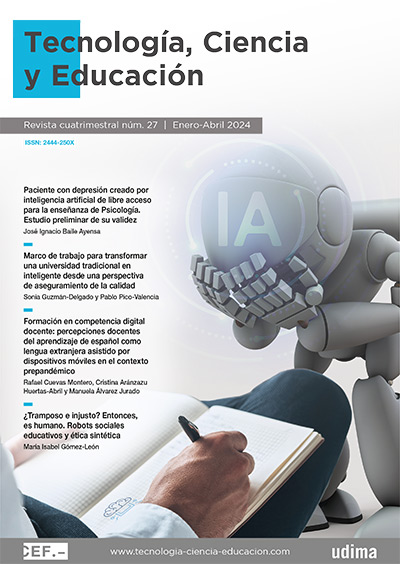Patient with depression created by freely accessible artificial intelligence for the teaching of Psychology. Preliminary study of its validity
DOI:
https://doi.org/10.51302/tce.2024.19069Keywords:
artificial intelligence, university education, Psychology, clinical practices, virtual patients, validity study, Turing testAbstract
Open artificial intelligence is a technological tool with great teaching possibilities. In Psychology teaching, practice with simulated patients is common, therefore, having easily accessible technologies that can create virtual patients (man or woman) is understood as a great opportunity. The objective of this work is to create a virtual patients with depression using open access artificial intelligence and verify its usefulness for teaching Psychology.
To achieve this objective, a patient has been created with Character.AI, and has been given the characteristics of a person with depression, according to international criteria from the scientific community. Subsequently, the virtual patient has been subjected to several validity tests, following the Turing test format, as well as a validity test under the judgment of experts.
It is concluded that, the patient behaves, in general terms, like a patient with depression, passing tests with different degrees of validity, with the expert judgment test being the one in which he has shown the most difficulties.
Although the virtual patient created has various deficiencies, possibly associated with the strict way of creating the profile and the short experimentation time, it is estimated that this artificial intelligence tool has interesting teaching options in the field of Psychology.
Downloads
References
APA. (2014). Manual diagnóstico y estadístico de los trastornos mentales (DSM-5). Editorial Médica Panamericana.
Ardila, R. (2011). Inteligencia. ¿Qué sabemos y qué nos falta por investigar? Revista de la Academia Colombiana de Ciencias Exactas, Físicas y Naturales, 35(134), 97-103.
Cabero Almenara, J. y Llorente Cejudo, M.ª C. (2013). La aplicación del juicio de experto como técnica de evaluación de las tecnologías de la información (TIC). Revista Educaweb, 7(2), 11-22.
CIBERSAM. (2003). General Health Questionnaire (GHQ-28 items). https://biadmin.cibersam.es/Intranet/Ficheros/GetFichero.aspx?FileName=CUESTIONARIO_GHQ-28.pdf
Enoch, L. C., Abraham, R. M. y Singaram, V. S. (2022). A comparative analysis of the impact of online, blended, and face-to-face learning on medical students' clinical competency in the affective, cognitive, and psychomotor domains. BMC Medical Education, 22(1), 753. https://doi.org/10.1186/s12909-022-03777-x
Europa Press. (2023). Así es Character.AI: el chatbot que permite hablar con cualquier famoso. El Confidencial. https://www.elconfidencial.com/tecnologia/2023-01-16/chatbot-characteria-hablar-personaje-famoso_3558600/
European Commission. (2022). A European Approach to Artificial Intelligence. https://digital-strategy.ec.europa.eu/en/policies/european-approach-artificial-intelligence
Fernández-Ballesteros, R. (2004). Evaluación psicológica: conceptos, métodos y estudio de casos. Pirámide.
Ferrando, L., Bobes, J., Gibert, J., Soto, M. y Soto, O. (2000). 1.1. MINI. Entrevista neuropsiquiátrica internacional, 1-25. https://www.fundacionforo.com/pdfs/mini.pdf
Franco Corso, S. J., Delgado, M. B. y Gómez-Restrepo, C. (2012). Uso de pacientes simulados en psiquiatría. Revista Colombiana de Psiquiatría, 41, 52-68.
García-Peñalvo, F. J. (2019). Una introducción a la inteligencia artificial. GRIAL. https://doi.org/10.5281/zenodo.3164370
Hall, M. J., Adamo, G., McCurry, L., Lacy, T., Waits, W., Chow, J., Rawn, L. y Ursano, R. J. (2004). Use of standardized patients to enhance a psychiatry clerkship. Academic Medicine: Journal of the Association of American Medical Colleges, 79(1), 28-31. https://doi.org/10.1097/00001888-200401000-00008
NIUS. (2023). Italia bloquea el uso de ChatGPT por no cumplir con la legislación de protección de datos. https://www.niusdiario.es/internacional/europa/20230331/italia-bloquea-uso-chatgpt-no-cumplir-legislacion-proteccion-datos_18_09161353.html
OMS. (2021). Depresión. https://www.who.int/es/news-room/fact-sheets/detail/depression
Retolaza Balsategui, A., Mostajo, A., Rica, J. R. de la, Díaz de Garramiola, A., Pérez de Loza, J., Aramberri, I. y Márquez, I. (1993). Validación del cuestionario de salud general de Goldberg (versión 28 ítems) en consultas de atención primaria. Revista de la Asociación Española de Neuropsiquiatría, 13(46), 187-194.
Santander Universidades. (2021). Test de Turing: ¿pueden las computadoras sustituir a los humanos? https://www.becas-santander.com/es/blog/test-de-turing.html
Siemerkus, J., Petrescu, A. S., Köchli, L., Stephan, K. E. y Schmidt, H. (2023). Using standardized patients for undergraduate clinical skills training in an introductory course to psychiatry. BMC Medical Education, 23(1), 159. https://doi.org/10.1186/s12909-023-04107-5
Turk, B., Ertl, S., Wong, G., Wadowski, P. P. y Löffler-Stastka, H. (2019). Does case-based blended-learning expedite the transfer of declarative knowledge to procedural knowledge in practice? BMC Medical Education, 19(1), 447. https://doi.org/10.1186/s12909-019-1884-4
Downloads
Published
How to Cite
Issue
Section
License
Copyright (c) 2024 José Ignacio Baile Ayensa

This work is licensed under a Creative Commons Attribution-NonCommercial-NoDerivatives 4.0 International License.


























